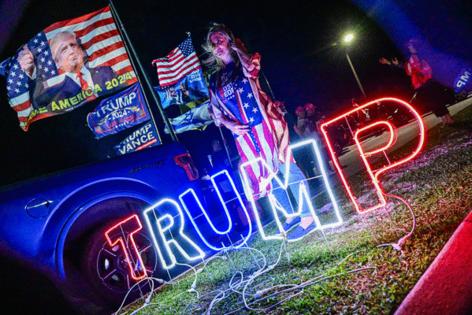Commentary: The fights over culturally divisive issues in schools? They cost billions that could be spent helping kids
Published in Op Eds
Education policy received little to no attention during much of the presidential campaign. But, in the final phase, Donald Trump was asked during a “Fox & Friends” interview how he would fix schools. His reply: “No transgender, no operations.… There are some places, your boy leaves the school, comes back a girl.”
That was a lie. But it was far from the first time Trump, the Republican Party and a wide-range of conservative activists leveraged fears related to schooling for partisan gain. Over the last three years, there has been a coordinated and intentional political strategy targeting public schools.
Our team of university researchers spent the past months surveying and interviewing hundreds of school superintendents about the costs of dealing with culturally divisive conflict, such as battles over LGBTQ+ rights, teaching about race and racism, and efforts to ban books. Their answers are troubling. One in 10 were physically threatened. Many were barraged by false rumors and accusations. Two-thirds of the 467 school superintendents in our national survey reported experiencing moderate to high levels of culturally divisive conflict.
School districts bear significant financial costs as a result. Security, communications, legal work and heightened staff turnover related to conflict all come with price tags and can involve redeployment of staff time. We found that the costs incurred by U.S. public schools’ responses to culturally divisive conflict totaled $3.2 billion during the 2023-24 school year alone. On average, a school district serving 10,000 students is spending nearly $500,000 a year if it is experiencing moderate levels of conflict, and more than $800,000 if conflict levels are high.
The money public schools are spending on these clashes could be better spent elsewhere. With an additional $3.2 billion, it would be possible to expand the national School Breakfast Program budget by more than half — ensuring more quality and nutritious meals for students in need. Or, such funds could be used to hire an additional counselor or psychologist for every public high school in the country. After-school programs in the arts or STEM might be expanded. The possibilities are nearly endless.
Aside from the sizable financial costs of conflict, there are the broader educational and societal costs. Our survey found chilling effects that are undermining education. Many educators are choosing to not engage students in discussion of issues deemed controversial. A superintendent from a rural district reported, “We are starting to get pushback when we ask kids to form their opinion,” adding that parents have told him, “I will teach my kid what to think.” But schools are a place where young people can learn how to engage in conversation with people who think differently, an important skill in our divisive society.
A suburban superintendent commented: “The undermining of public trust and government operations is being intentionally inflicted on our population and many people do not realize the long-term effects this will have on our nation.”
Elections don’t just have consequences; they have costs. Given the political success of fomenting cultural division, we should expect conflict campaigns aimed at our schools to continue, perhaps especially with the aid of Trump’s bully pulpit. He has said he would eliminate the Department of Education altogether.
So what can be done? In our interviews with superintendents and in our work with educators broadly, we hear that they want to create schools that are welcoming and foster a sense of belonging for all students. They want young people to be able to engage with the full history of the country and with controversial issues in ways that center evidence, reflection, discussion and civility. To feature such programs in their schools, they will need broad public support.
Educators need the public to be engaged and to have their backs. Parents and community members should talk regularly about what they appreciate about educators’ work and the importance of treating all students with dignity and respect.
And if politicians, school board members, parents or others enact conflict campaigns to disrupt and undermine trust, it’s vital that the public speaks out against them. If local communities can help put the conflict entrepreneurs out of business, educators can focus on improving learning. Young people will feel safer and more supported. And schools might just save millions.
____
John Rogers is a professor of education and associate dean for research and public scholarship in the UCLA School of Education and Information Studies. Joseph Kahne is a professor of education policy and politics at UC Riverside and co-director of the Civic Engagement Research Group.
©2024 Los Angeles Times. Visit at latimes.com. Distributed by Tribune Content Agency, LLC.




























































Comments